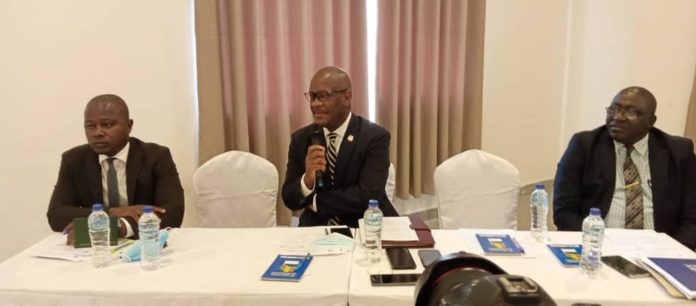By Millicent Senava Mannah
The National Civil Registration Authority (NCRA) has on the 26th October 2021 signed a Memorandum of Understanding (MoU) with the Ministry of Health and Sanitation (MOHS) that is geared towards putting together ways to improve or strengthen the Births and Deaths registration in the country with effect from the 1st of November. The signing ceremony took place at Sierra Palms Resort in Freetown.
During the ceremony the two institutions also used the opportunity to present a Mobile App which is a technology they introduced to support the notification and registration of Births and Deaths in the country.
Delivering his statement, Director General of the National Civil Registration Authority (NCRA) Mohamed Mubashir Massaquoi, said that on assuming office as the Director General in 2018, he signed a Memorandum of Understanding with the Ministry of Health and Sanitation because of its strategic relevance in the management of two events: Births and Deaths, which hitherto had been managed fully by the MoHS and that the indisputable relevance of the Ministry of Health and Sanitation was envisaged by drafters of the NCRA Act, a reason that informed the inclusion of the Chief Medical Officer as a statutory Member of the Board of Authority of the NCRA.
He added that NCRA decided to engage the leadership of the Ministry of Health both at Political, Technical/Professional and Operational levels also at National and District levels, to discuss and come up with realistic ways forward that will improve Births and Deaths registration services at all levels of healthcare deliveries and also in communities where there are no health facilities in a sustainable manner that guarantees the production of accurate Vital Statistics consistent with Section 26 of the NCR Act, 2016 for the good of all.
The DG maintained that Birth Registration is a fundamental right of the child as enshrined in the United Nations Convention on the Rights of the Child, to which Sierra Leone is a Signatory. Birth Registration establishes a child’s right to legal identity necessary for the enjoyment of other rights provided by International and National Legal Frameworks. This legal provision has been domesticated in the Child Rights Act of 2007 and in the National Civil Registration Act of 2016.
He noted that as the main provider of healthcare delivery service in the country, the Health Facilities of the Ministry of Health and Sanitation are key for collecting information for the registration of Births and Deaths and that is why as part of their collaborative efforts and following an assessment done on the status of health facilities in 2018 with support from UNICEF, the NCRA has conducted series of trainings for designated healthcare workers especially those who provide Births and Deaths registration services in their respective Primary, Secondary and Tertiary healthcare facilities across the country.
Those trainings, he said, have largely been aimed at sharpening the skills and competencies of those staff in the recording and completion of Births and Deaths Registration Tools and documents.
“In conclusion, while reiterating the importance of Civil Registration and Vital Statistics in public administration, good governance and healthcare interventions, let me take this opportunity to thank our Development Partners namely UNICEF, WHO, UNFPA, UNDP, EUD and the Irish Aid that are supporting Births and Deaths Registration and in general, the CRSV and ID Management Service in Sierra Leone. To also thank the Government of Sierra Leone through the Ministry of Finance for the continued support towards the CRVS and ID Management System and for particularly supporting this very important engagement,” he concluded.
The Minister of Health and Sanitation, Dr. Austin Demby ,said that the two most important events in every life is the documentation of arrival on this earth and the exit from it. And that it is one of the most profound and personal records that defines a person with a true sense of belonging and absence of both records is unfathomable both at individual and at the national levels.
He maintained that traditionally, such records in the country are initiated for the most part by health facilities, because such processes have involved manual entry of information with ultimate submission to the Birth and Deaths Registry, describing the process as delayed and inefficient, adding that the completeness of Births and Deaths records for 2020 were as low as 34.2 percent and 16.2 percent respectively of which he stated that such inefficiencies of births records as an example has major implications for effective care and monitoring of babies during the very critical stages in their lives.
The Minister concluded by saying that the signing of the MoU between the NCRA and the Ministry of Health and Sanitation means they have arrived at a mutually supportive solution and that this solution takes advantage of the bio-secure digital tool that NCRA has produced furthering that he is very confident that they will bring efficiency, effectiveness, completeness, and timeliness to this important service to the nation and to every individual.
WHO Health Systems Coordinator Dr. Selassi D’Almeida said that Civil Registration and vital Statistics is very important to WHO as reflected in World Health Assembly Resolution WHA67.14 of 24 May 2014 in which members States were urged in the context of the development agenda beyond 2015, to recognize the importance of accountability by strengthening of civil registration and vital statistics and health information systems, which can be used for monitoring health equity by providing disaggregated data.
He added that WHO is mandated to support the strengthening of Civil Registration and Vital Statistics of which registering Births and Deaths is part of the continuum and in ensuring that Civil Registration is prioritized by member States.




